How George Lucas Killed Conan the Barbarian

Whatever happened to Sword and Sorcery?
The fantasy genre has certainly changed significantly since Robert E. Howard wrote his Conan the Barbarian and Kull of Atlantis stories. Back when elves made toys, dwarves sang “Hi ho!”, rangers tracked down stolen pic-a-nic baskets, and no one even knew what an orc was. From the 1920s to late 1970s there was a steady stream of good S&S stories, both long and short form. So why does it that style feel so outdated, so far removed from the modern writings that flood bookstore shelves? It’s not as if we’ve lost our taste for magic, swordfights, castles, and medieval warfare, right? Of course not, but there’s no denying that the genre has changed. But why?
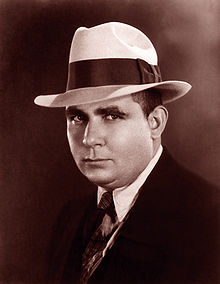
Well, let’s look back at what defines Sword and Sorcery. The actual term is significantly younger than the subgenre. In 1961, Michael Moorcock wrote a letter to Arma magazine in which he insisted that the works of Robert E. Howard be given a new name to classify them. He suggested the term “epic fantasy”, but Franz Leiber, a contemporary of Howard, recommended the term “sword and sorcery”, probably inspired by the “sword and sandal” subgenre of historical fiction films that were popular at the time (see the Hercules, Maciste, and Goliath series); the latter stuck.
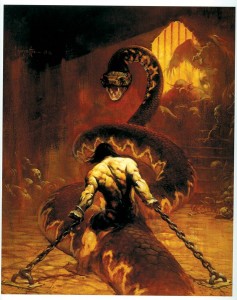
The scope of a typical S&S story is small; focusing on one or two main characters that must overcome some personal ordeal, escape from a prison, reaching the treasure atop the tower. In regards to the world the hero occupies, he/she rarely has the ability to change much; they simply survive. Despite however strong the hero may be, and they are among the most overpowered heroes in fiction, it is always clear that they are not invincible; they are still infinitely small in the face of the greater world narrative. It is this definitive small scope that gave the author the ability to heighten the emotional stakes, making their characters at once relatable and larger than life.
So, we return to the initial question, what changed? Why is it that now nearly every fantasy story involves the fall of an empire, the coming of the apocalypse, or the collapse of society? It’s an old adage in storytelling that we should be witnessing the most interesting part of the characters’ lives; but what may appear as interesting on a grand scale, may not be all that impactful to our heroes. So, why the trend towards earth shattering stories as opposed to character study?
In a few words…

George Lucas’s 1977 film about a young farm boy with a special sword taking down an evil empire that would destroy entire planets shook the foundations of fiction writing. Make no mistake, Star Wars is fantasy; science-fantasy to be sure, but fantasy none-the-less. It has nothing to do with science. The Force is just a spacey way of saying magic, light sabers are swords, Jedi knights are… knights (duh), and the space ships are stand-ins for pirate ships, horses, and dragons. Once Star Wars hit the big screens audiences wouldn’t go for small stories anymore, everything had to get big.
Add to this the growing fandom for the works of Tolkien. His epic Middle Earth sagas from the 1950’s had managed to garner a cult following but were not yet the standard for fantasy that they are today. Now the winds had changed.
Lucas forced the scale; Tolkien defined the texture; and what became of S&S? It got left behind, left to ruins as the sands of time washed over it. The heightened emotions were received as camp, and adaptations to film had to be altered to raise the stakes to a Star Wars level of global importance. A 1982 Conan the Barbarian film staring Arnold Schwarzenegger saw significant changes to the original character, creating a rift between fans of the Howard’s stories, and putting off potential readers who found S&S movies too goofy, to the point where the name “Sword and Sorcery” is spoken with derision and a haughty roll of the eyes.
There have been attempts at revitalizing the genre. The works of seminal S&S writers have been collected into anthologies, up through the 90s. And there have been recent attempts in recent years to bring S&S into the 21st century, with authors like Steven Erikson receiving positive acclaim, and the flourishing of online publications such as Flashing Swords and Beneath Ceaseless Skies.

Will we ever see a return to the glory days of S&S? No. Even Erikson and his colleagues have had to adjust with the times. Their stories place the typical S&S hero into a larger reaching adventure expected of contemporary fantasy, where they feel awkward and out of place, rather than definitively a product of their environment. The great appeal of the first wave of S&S was its alien nature, the draw of that foreign quality to places and people reminiscent of legends from a bygone age. The expanded details of a more closely defined world create a distance between the reader and any sense of true exploration, the aspects of the fantasy being spelled out rather than discovered.
So, no, S&S will never return to its former glory, but that’s fine. Genres are always changing and evolving over time. If they didn’t, today’s fantasy authors would fill their books with the endless roll calls of The Iliad, or the dull repetitive verse of the Epic of Gilgamesh. The change is good, even if it is sad. Do some of the newer writers fall short? Yes. Are some of the newer stories a complete waste of space and thought? You bet. But are there gems amid the unwashed stones? Absolutely. The end of one wave of storytelling gives birth to another, and that to another and so on; as long as man endures he will fill the air with the tales of his imagination.
“’Be of good heart,’ cry the dead [writers] out of the living past. All our songs will be silenced. But what of it? Keep on singing.” (Orson Welles — F for Fake; 1975)
![]()

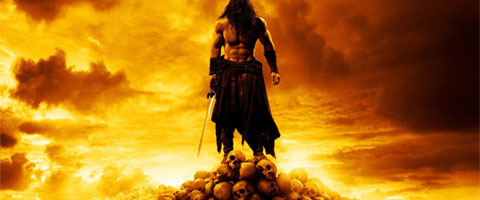


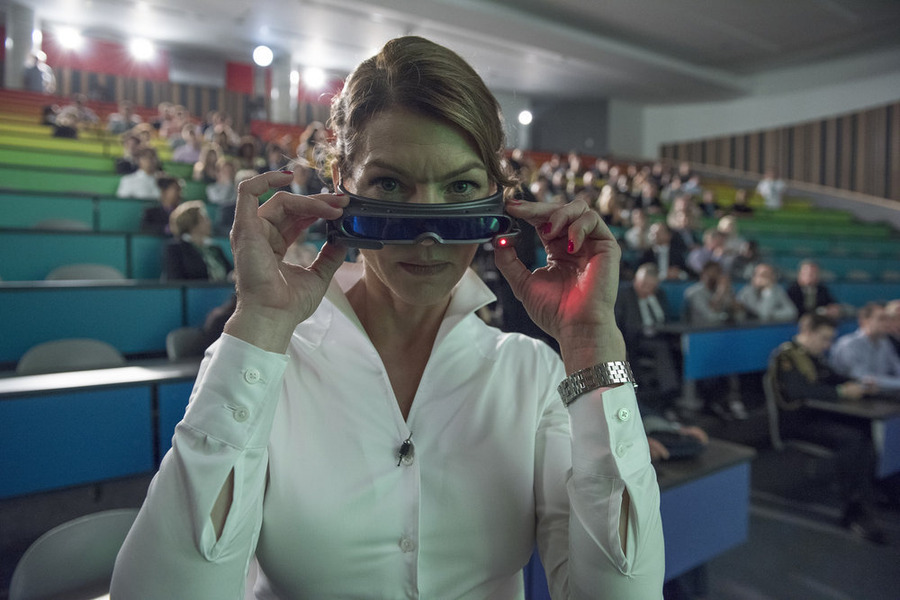
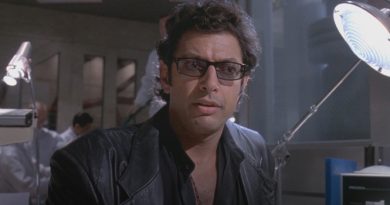
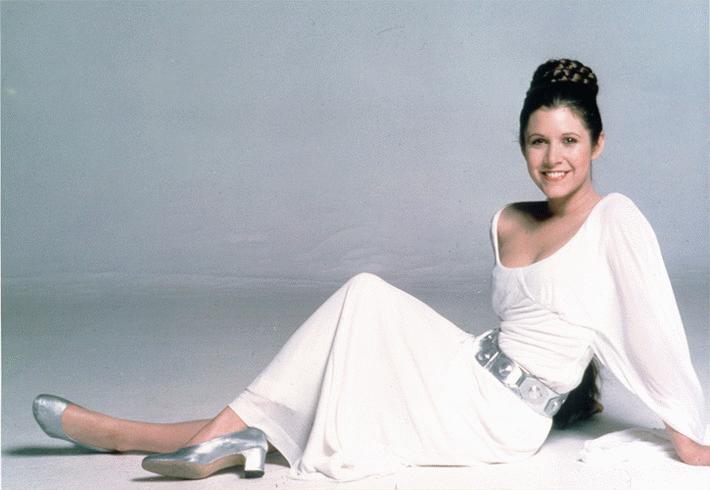
I miss these movies. Still watch these old movies all the time. They still rock!
A nice plea for a genre you like but blaming George Lucas seems off to me. Star Wars fans stuck thru Jar Jar Binks, mediocre comics, and bad paperbacks. Conan fans did not idly accept Otli, Zeben, and Bayu. The Marvel comics quit selling. The Tor Paperbacks fizzled out Arnold went to the future and Mars but did not want to go back to the Hyborian Age.
For whatever reasons Conan fans don’t have the zeal (or numbers) of Star Wars fans. S&S was mainly a paperback publishing phenom. Back in the day, light reading on planes, trains, and buses was a thing. Kindle S&S could become a thing I suppose.
Now we have Dark Horse comics and a possible new Arnie movie. The comics seem stable enough and the movie could be entertaining. So I wouldn’t say”never” to a S&S reawakening but it will most likely be updated. Cute teenagers with sword in post-apocalyptic world?
Films and TV have generally larger audiences than any books have or hope to have. Most clearly demonstrated by the the success of Game of Thrones. Popular series before the TV show but those reader numbers really rocketed after the TV show but still the large portion of the TV audience has not touched the books and never will. This also applies to Star Wars but in reverse. Only a small amount of those who admit to liking Star Wars follow the associated tv shows, read the books that expand the story or buy the merchandise.
However, I do not disagree that the Conan fans have low numbers and that we are widely spread around.